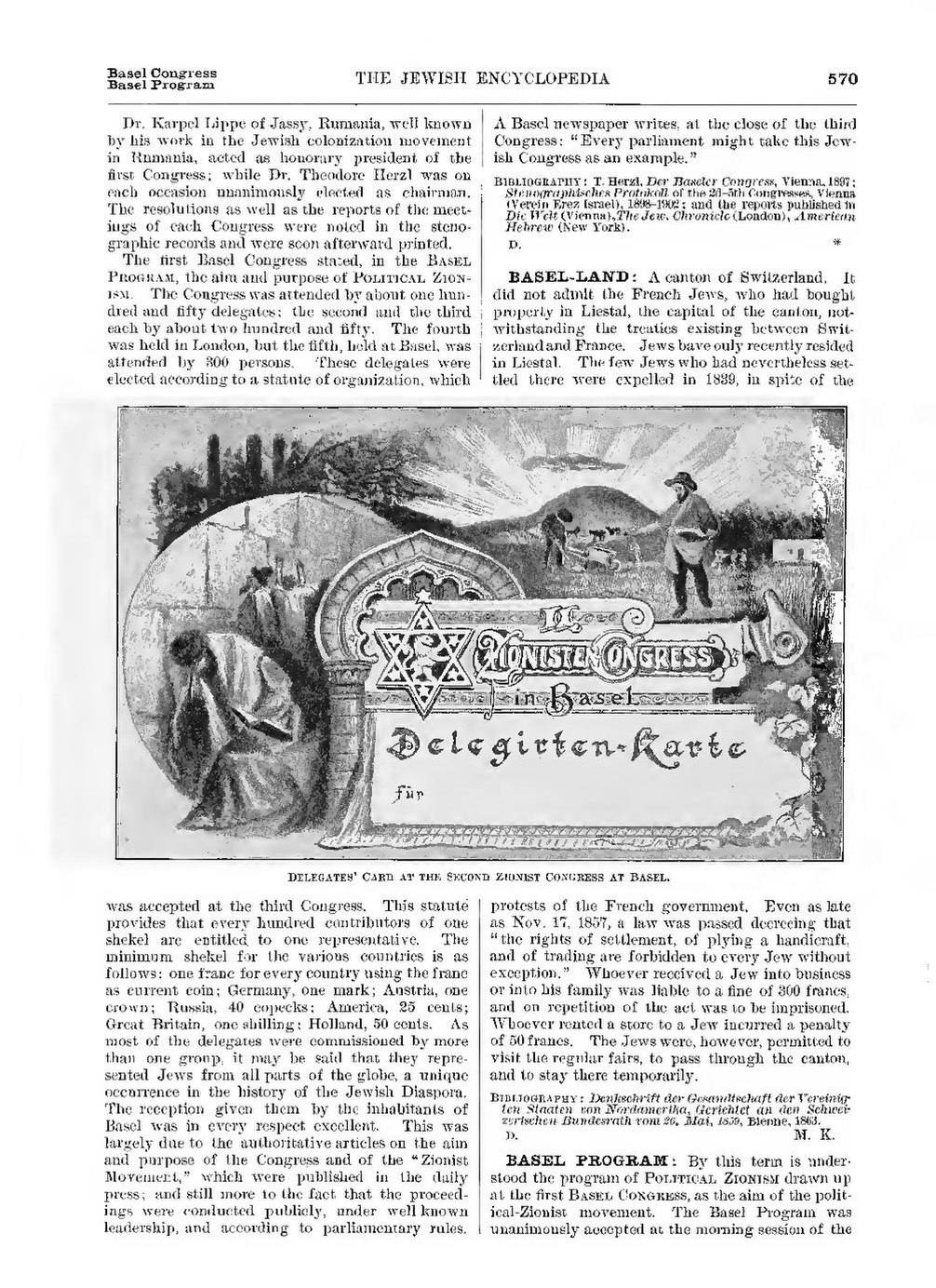Basel Congress Basel Program
THE JEWISH ENCYCLOPEDIA
Dr. Karpel Lippe of Jassy, Rumania, well known his work in the Jewish colonization movement in Rumania, acted as honorary president of the first Congress; while Dr. Theodore Herzl was on each occasion unanimously elected as chairman. The resolutions as well as the reports of the meetings of each Congress were noted in the stenographic records and were soon afterward printed. The first Basel Congress stated, in the Basel Program:, the aim and purpose of Political Zionism. The Congress was attended by about one hundred and fifty delegates the second and the third each by about two hundred and fifty. The fourth was held in London, but the fifth, held at Basel, was attended by 300 persons. These delegates were elected according to a statute of organization, which
by
A Basel newspaper
570 writes, at the close of the third
Congress: "Every parliament might take this Jewish Congress as an example. Bibliography
T. Herzl,
Der BtucUr
Congress, Vienna, 1897
Stenoaraphisches ProtokoU ol the 2d-oth Congresses, Vienna (Verein Erez Israel), 1898-1903 and the reports published in Die Welt (Vienna), The Jew. Chronicle (London), American Hebrew (New York)
D.
BASEL-LAND A
canton of Switzerland. It did not admit the French Jews, who had bought property in Liestal, the capital of the canton, notwithstanding the treaties existing between Switzerland and France. Jews have only recently resided The few Jews who had nevertheless setin Liestal. tled there were expelled in 1839, in spite of the
Delegates' Card at the Second Zionist Congress at Basel.
was accepted
This statute at the third Congress. provides that every hundred contributors of one The shekel are entitled, to one representative. minimum shekel for the various countries is as follows one franc for every country using the franc as current coin; Germany, one mark; Austria, one crown; Russia, 40 copecks; America, 25 cents; Great Britain, one shilling; Holland, 50 cents. As most of the delegates were commissioned by more than one group, it may be said that they represented Jews from all parts of the globe, a unique occurrence in the history of the Jewish Diaspora. The reception given them by the inhabitants of Basel was in every respect excellent. This was largely due to the authoritative articles on the aim and purpose of the Congress and of the "Zionist Movement," which were published in the daily press; and still more to the fact that the proceedings were conducted publicly, under well-known leadership, and according to parliamentary rules.
protests of the French government. Even as late as Nov. 17, 1857, a law was passed decreeing that " the rights of settlement, of plying a handicraft, and of trading are forbidden to every Jew without exception." Whoever received a Jew into business or into his family was liable to a fine of 300 francs,
and on repetition of the act was
to
be imprisoned.
Whoever rented a store to a Jew incurred a penalty of 50 francs. The Jews were, however, permitted to visit the
regular
fairs, to
pass through the canton,
and to stay there temporarily. Bibliography
Denksehrift der Gesandtsclmft der Vereiniqten Staatcn von Nordamerika, Oerichtet an den Schweizerischen Bundesrath vom 26. Mai, 1859, Bienne, 1863. d. M. K.
BASEL PROGRAM
By
this
term
stood the program of Political Zionism at the first ical-Zionist
is
under-
drawn up
Basel Congress, as the aim of the politmovement. The Basel Program was
unanimously accepted
at the
morning
session of the
